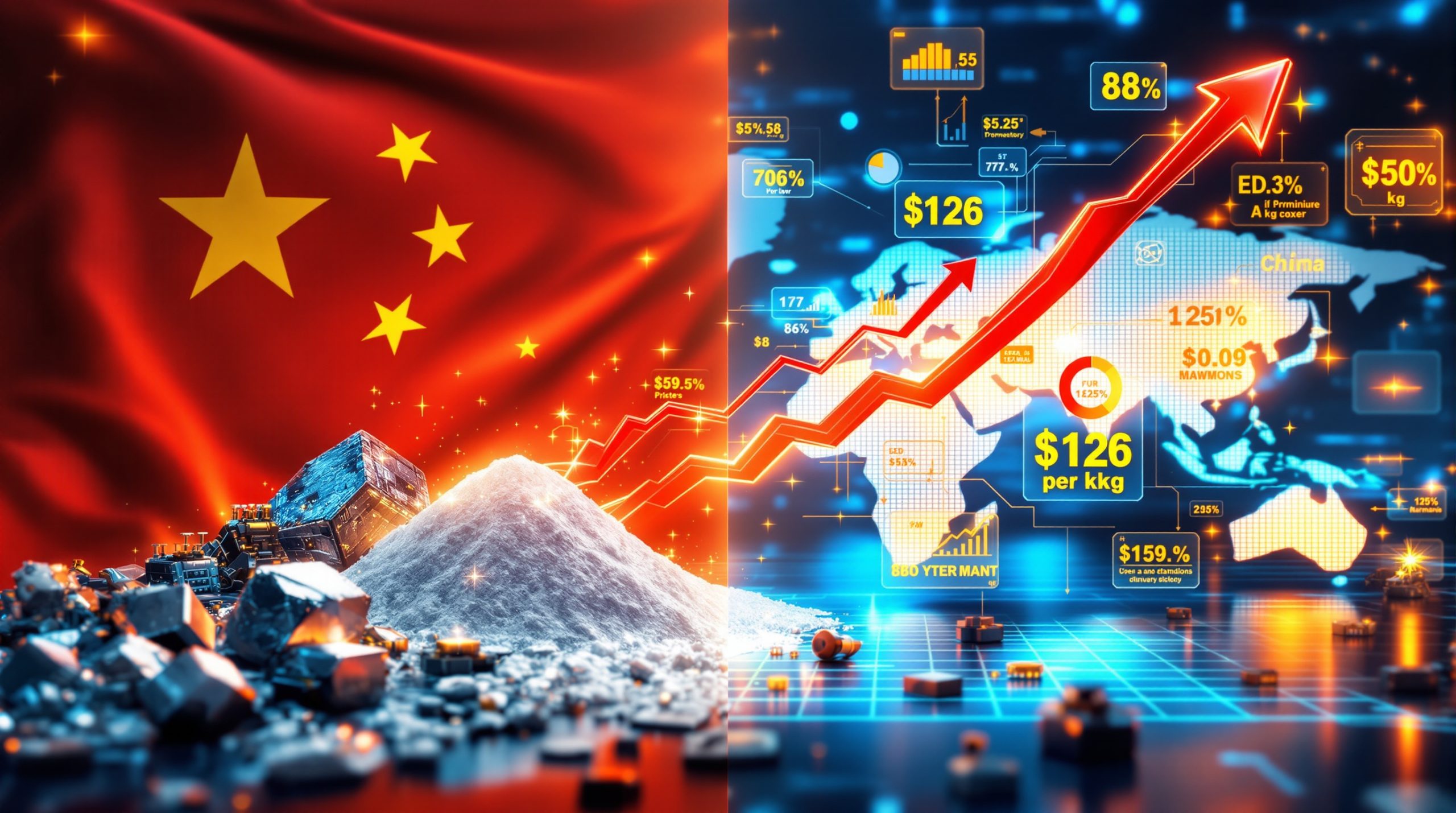MP Materials Halts Rare Earth Supply to China Amid Retaliatory Tariffs
MP Materials, the only active rare earth mining operation in the United States, has made the strategic decision to halt all rare earth concentrate shipments to China following the implementation of punitive tariffs. The company announced it would cease selling materials to Chinese processors after China imposed a staggering 125% tariff on rare earth imports from the US, effectively rendering the trade economically unviable.
"Selling our valuable critical materials under 125% tariffs is neither commercially rational nor aligned with America's national interest," stated MP Materials in their official announcement. This decisive action marks a significant turning point in the global rare earth supply chain, with far-reaching implications for both US national security and the broader technology manufacturing sector.
The Mountain Pass mine in California, operated by MP Materials, has historically been a crucial supplier of rare earth concentrate to Chinese processors. This development threatens to further strain already tense US-China trade relations while simultaneously accelerating domestic processing initiatives.
What Led to MP Materials' Decision to Halt Chinese Shipments?
Understanding the 125% Retaliatory Tariffs
China's implementation of 125% tariffs on US rare earth imports represents a calculated response to broader trade tensions between the two economic superpowers. These tariffs were specifically designed to target the US rare earth industry, which has been working to reduce dependency on Chinese processing facilities.
The retaliatory tariffs came after the US imposed critical mineral export restrictions on Chinese access to semiconductor technology, highlighting the increasingly interconnected nature of high-tech trade disputes. For MP Materials, the tariffs created an untenable business situation that would have severely undermined their financial viability if shipments had continued.
Industry analysts note that China's aggressive tariff strategy appears designed to protect its dominant position in rare earth processing, which it has cultivated over decades through strategic investments and less stringent environmental regulations than those found in Western nations.
The US-China Rare Earth Trade Relationship
The relationship between US rare earth miners and Chinese processors has been historically symbiotic yet unbalanced. Despite mining significant quantities of rare earth concentrate, the US has lacked the domestic processing infrastructure necessary to transform raw materials into usable products. This created a fundamental dependency on Chinese processing facilities.
MP Materials has been shipping approximately 85% of its rare earth concentrate to China for processing, creating a significant vulnerability in the supply chain. This arrangement has been problematic from a national security perspective, as rare earth elements are critical components in defense systems, renewable energy technologies, and consumer electronics.
"This halt effectively cuts off a key revenue stream for the company," noted Reuters in their analysis of the situation. However, MP Materials has been steadily working to reduce this dependency through substantial investments in domestic processing capabilities, positioning the company to weather this disruption better than it might have in previous years.
How Is MP Materials Adapting to This Trade Disruption?
Current Stockpiling and Processing Strategy
Rather than continuing shipments under economically unfavorable conditions, MP Materials has implemented a strategic stockpiling initiative. The company is temporarily storing rare earth concentrate that would have been shipped to China while ramping up domestic processing operations.
Currently, MP Materials' California refinery is processing nearly 50% of the company's production domestically—a significant increase from previous years. This processed material is primarily being directed to markets outside of China, with Japan, South Korea, and domestic US manufacturers becoming increasingly important customers.
The stockpiling strategy aligns with broader US government initiatives, including the Defense Logistics Agency's rare earth stockpile programs, which aim to ensure material availability during supply chain disruptions. This approach allows MP Materials to maintain production levels while transitioning to more diverse customer relationships.
Accelerating Domestic Supply Chain Development
MP Materials has invested nearly $1 billion to establish a complete rare earth supply chain within the United States—a strategy that now appears prescient given recent developments. These investments focus on three critical areas: increasing oxide production capacity, advancing heavy rare earth separation capabilities, and initiating magnet production at new facilities in Texas.
"We have been preparing for this moment since day one," the company stated, emphasizing that their long-term strategy anticipated potential disruptions in the US-China trade relationship. The acceleration of these domestic initiatives is expected to significantly reduce US vulnerability to foreign supply chain disruptions.
The company's Texas magnet production facility represents a particularly crucial element of their strategy, as it aims to bypass China's near-monopoly in permanent magnet manufacturing. Permanent magnets, which contain neodymium, praseodymium, and other rare earth elements, are essential components in electric vehicles, wind turbines, and numerous defense applications.
What Are the Broader Implications for US Rare Earth Security?
Strategic Alignment with US Critical Minerals Policy
MP Materials' decision aligns perfectly with recent US policy initiatives aimed at securing domestic supply chains for critical minerals. President Donald Trump recently ordered an investigation into potential new tariffs on critical minerals imports, focusing particularly on materials essential to defense and high-technology applications.
This policy direction reflects growing bipartisan consensus regarding the strategic importance of rare earth elements and the risks associated with continued dependence on Chinese processing. MP Materials highlighted their "close collaboration with federal leaders" in supporting American industry, indicating tight coordination between corporate strategy and national security objectives.
The Pentagon's 2024 funding allocations for rare earth projects further underscore the strategic priority being placed on developing domestic supply chains. These initiatives aim to reduce vulnerability to supply disruptions like the one currently unfolding, which has been further complicated by Trump's trade policies affecting global commodity markets.
Industry Response to Supply Chain Disruption
The halt in Chinese shipments has created immediate ripple effects throughout technology manufacturing sectors. MP Materials reports receiving "urgent inquiries from manufacturers in critical industries" seeking secure and resilient sources of rare earth materials and magnets.
These manufacturers—spanning sectors from automotive to renewable energy to defense—are increasingly concerned about supply chain security and are willing to pay premium prices for materials sourced through more reliable channels. This shift in procurement priorities may accelerate the reconfiguration of global supply chains toward more resilient structures.
MP Materials states it is "uniquely positioned to answer that call" for domestic supply, highlighting its first-mover advantage in US rare earth processing. As one of the few Western companies with significant rare earth expertise, MP Materials stands to benefit substantially from the industry-wide pivot toward supply chain security.
FAQ: MP Materials and Rare Earth Supply Chains
What are rare earth elements and why are they important?
Rare earth elements comprise a group of 17 metals with exceptional magnetic, luminescent, and electrical properties. Despite their name, most rare earths are relatively abundant in the Earth's crust, but they rarely occur in concentrated deposits, making economical extraction challenging.
These elements are essential components in numerous high-technology applications, including:
- Neodymium and praseodymium for permanent magnets used in electric vehicles and wind turbines
- Lanthanum and cerium for catalytic converters and petroleum refining
- Europium and terbium for LED lighting and display technologies
- Dysprosium and holmium for specialized defense applications
Their unique properties make rare earths virtually irreplaceable in many applications, creating strategic vulnerabilities when supply chains are disrupted. Additionally, mining's role in clean energy transition has highlighted the importance of securing reliable supplies of these critical materials.
How dependent is the US on Chinese rare earth processing?
China has established a dominant position in rare earth processing, handling approximately 85% of the world's rare earth processing operations. This dominance stems from decades of strategic investments, less stringent environmental regulations, and technical expertise development.
The US has been working to reduce this dependency through various initiatives, including:
- Department of Energy funding for processing technology development
- Defense Production Act investments in critical mineral projects
- Tax incentives for domestic rare earth production
- Public-private partnerships to develop technical expertise
MP Materials' Mountain Pass mine, which produces approximately 15% of global rare earth concentrate, represents the cornerstone of US efforts to rebuild domestic supply chains. However, the processing capabilities needed to transform concentrate into usable materials remain limited in the United States.
What might be the long-term effects of this supply disruption?
The current disruption is likely to accelerate several long-term trends in the rare earth market:
- Accelerated development of US domestic processing capabilities, with government support playing a key role
- Potential price increases for rare earth materials in global markets, particularly for materials with defense applications
- Further decoupling of US-China supply chains in critical minerals sectors, with increased focus on "ally-shoring" to friendly nations
- Increased investment in rare earth alternatives and recycling technologies as manufacturers seek to mitigate supply risks
These effects will unfold over years rather than months, as building processing capacity requires significant time and investment. However, the trajectory toward increased supply chain resilience appears firmly established, with investors seeking geopolitical investor strategies to navigate these changing market dynamics.
The Future of MP Materials' Rare Earth Strategy
Building Resilience Through Vertical Integration
MP Materials' long-term strategy centers on complete vertical integration from mining through processing to finished magnet production. The company aims to achieve full vertical integration by 2027, creating a secure supply chain entirely within US borders.
"Our mission, capital strategy, and execution reflect a long-term vision built to withstand short-term dislocation," the company stated, emphasizing that current challenges were anticipated in their strategic planning. This vision includes not just extraction and basic processing but also advanced metallurgy and magnet manufacturing.
The technical challenges involved in this vertical integration are substantial. Magnet production requires specialized knowledge of sintering rare earth powders with iron and boron under precise conditions—expertise that has been concentrated in China for decades. MP Materials is investing heavily in developing this technical capability domestically, with a focus on strategic lithium investments to complement their rare earth operations.
Potential Market Opportunities
The disruption in Chinese trade relations creates significant opportunities for MP Materials to position itself as the premier non-Chinese supplier of rare earth materials. Premium pricing for secure supply chains could substantially enhance profit margins compared to the previous model of selling concentrate to Chinese processors.
MP Materials is increasingly focusing on supplying domestic US manufacturers and allied nations like Japan and South Korea. Japan's subsidies for MP Materials highlight emerging "ally-shoring" trends, where friendly nations coordinate to develop secure supply chains outside of China's influence.
For technology manufacturers concerned about supply chain security, MP Materials offers a compelling value proposition as a vertically integrated supplier with US-based operations. This positioning could allow the company to capture market share even if their production costs remain somewhat higher than Chinese competitors.
The company's strategic pivot away from Chinese markets represents not just a response to immediate tariff challenges but a fundamental realignment toward a more sustainable and secure business model aligned with US national interests.
Ready to Stay Ahead of Critical Mineral Supply Chain Disruptions?
Discover how to identify investment opportunities created by global supply chain shifts with Discovery Alert's proprietary Discovery IQ model, providing real-time notifications on significant ASX mineral discoveries. Explore historic examples of how major discoveries can generate substantial returns by visiting the Discovery Alert discoveries page and position yourself ahead of the market.




